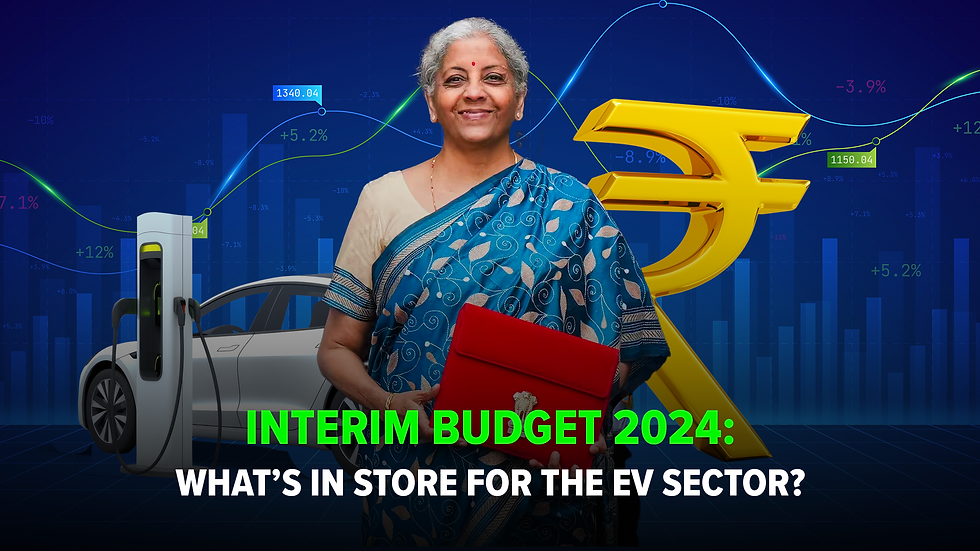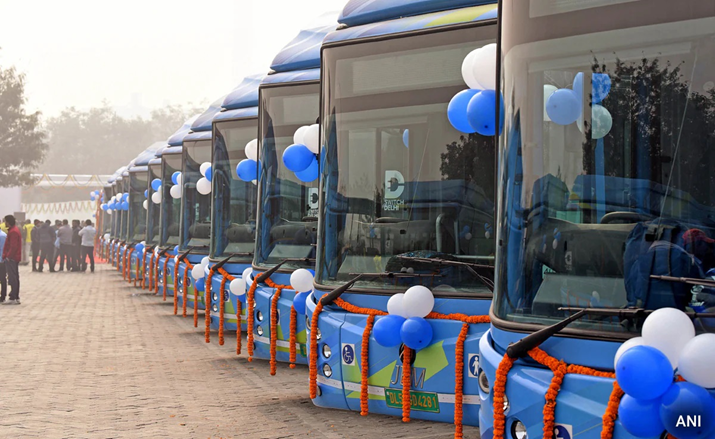Interim Budget 2024 - A green leap for Indian transportation
- EV Bazaar Tech
- May 2
- 2 min read
The electric vehicle (EV) sector in India is growing by leaps and bounds. And with the announcement of the plans, focusing on expanding the EV infrastructure in India, outlined by finance minister Nirmala Sitharaman in the Union Budget 2024 on February 1, the sector is set to witness a major boost.

Interim Budget’24: What’s in store for the EV sector?
The budget unveiled for the fiscal year 2024-2025 will focus on strengthening the EV ecosystem by supporting manufacturing and charging infrastructure for electric vehicles.
Another important plan set forth that could massively chunk out carbon emissions on roads is to encourage the adoption of electric buses for public transport networks by deploying payment security mechanisms.
What is the payment security mechanism?
The payment security mechanism (PSM) is a collaborative financial security mechanism between the US and India that would encourage manufacturers to establish manufacturing hubs in India in order to solve the financial obstacles to the adoption of e-bus.
The government hopes to increase transaction security through PSM by permitting secure payment systems (SPS). Reducing the risks associated with fraud and unauthorised access is crucial.
The Environment Minister speaks…
Environment minister Bhupendra Yadav said that the India-US PSM aims to encourage both Indian and international original equipment manufacturers (OEMs) as well as bus operators to join the e-bus movement through setting up manufacturing hubs in India. The initiative will eventually contribute to the growth of e-buses and their exports from India.
Why focus on e-buses?
Prioritising e-buses is essential for significantly curbing carbon emissions in the transportation sector, given that buses serve a broader population. It would be a significant stride towards India’s ambitious target of achieving net-zero emissions by 2070.

More in support of Electric Mobility
Furthermore, Sitharaman shared a plan to bring solar power to a million households, specifically to support electric vehicle charging. With this rooftop solar initiative, a million households can enjoy up to 300 units of electricity every month, absolutely free.
The budget also revealed some good news for the automotive industry. The allocation for the Production-Linked Incentive (PLI) scheme has seen a substantial increase, now standing at Rs 3,500 crore. What’s even more exciting is the boost for the advanced chemistry cell and battery storage in the PLI scheme, jumping from Rs 12 crore to Rs 250 crore.
Fundings for clean energy mobility
With a thrust on promoting clean energy vehicles, this year’s interim budget proposed 1,300 crore for e-buses. Through public-private partnerships, the government hopes to provide 169 cities with 10,000 electric buses as part of the PM-eBus Sewa program. The program would run till 2037 with a total cost of Rs 57,613 crore.
.png)



Comments